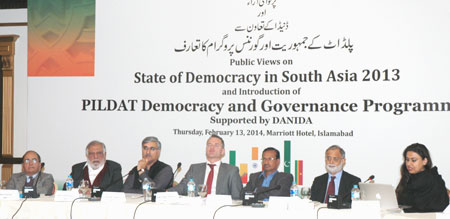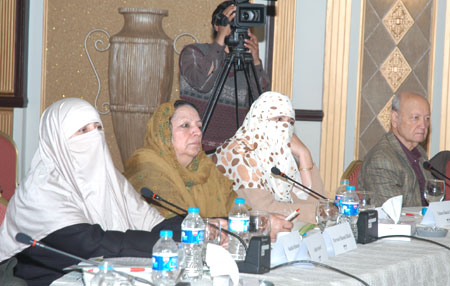|
|
| |
| EVENTS |
|
|
> Overall Satisfaction with Democracy Increased in Pakistan compared to India: Comparative Analysis of State of Democracy in South Asia Launched
|
|
|
| |
February 13; Overall satisfaction with democracy in Pakistan has increased in the past decade compared to India which has seen a negative trend in satisfaction in democracy in the past decade. The comparison was made available at a Roundtable Discussion on Public Views on State of Democracy in Pakistan 2013, a part of the State of Democracy in South Asia Initiative& to Introduce PILDAT Democracy&Governance Programme, supported by DANIDA. |
|
| |
53% of Pakistan�s population wassatisfied with democracy at the end of 2013, a 21% increasesince 2005, compared with India at 47% public satisfaction with democracy in 2013 and an 8% declinesince 2005. The shift in public opinion must alsobeseen in the context of each country where in Pakistan it has come at the startof a new Governmentwhile in India it has come at the end of a two-term Government.
|
|
| |
Scholars such as Dr. Ijaz Shafi Gilani believed that Pakistan�s public opinion reflects the positive trends witnessed in Pakistan�s journey towards democratic consolidation and struggle for rule of law. In Pakistan, support for representative Government, though at 78% compared to 86% in India, has seen a 16% improvement from 2005 compared to an 8% decline in India since 2005. |
|
| |
Similarly in Pakistan, disapproval of forms other than Representative Government. has risen in the past decade whereas in India, support of other forms � such as rule by strong leader, rule by the Army, Religious Leaders and Experts � has risen from 2005. support has risen. The dilemma of support for non-authoritarian rule in Pakistan. The results from the two nationally-representative surveys show that where in Pakistan opposition to authoritarian Government has risen in the past decade, its support has also risen; however indifference has declined on the issue. A challenge for Pakistan�s democracy, as captured in the survey, is that dissatisfaction with democracy rises with education in Pakistan (most support for democracy � at 63% comes from the uneducated segments). The challenge is thatposed by the political parties which have a closed door policy to new entrants and unless there is a devolution in Government, educated classes will continue to be disillusioned and feel irrelevant in the democratic process, analysed Dr. Gilani. |
|
| |
Presenting his analysis at the Roundtable, Dr. Hasan-Askari Rizvi said that in interpreting the survey results, one must remember that democracy is a multi-dimensional process and not an end product. Democracy is a constant effort of improvement in every country. He said that the concept of attachment and alienation best defines commitment to democracy which reflects through the willingness of a populace to stand for democracy. He said that while Pakistan shows greater satisfaction with democracy, the core of Pakistan�s political system is at threat which is not the same in India. Support for democracy exists in the whole of South Asia, however the details differ in terms of levels of alienation and attachments. |
|
| |
Presenting his welcome remarks at the Roundtable, Syed Naveed Qamar, MNA, Chair of National Assembly Standing Committee and former Federal Minister, said that over the past decade, PILDAT has beena partner in Pakistan�s quest of democracy. For the Parliament and political parties, PILDAT has remained a leading friend which has helped hold our hands in strengthening and consolidation of democracy, adding that nowthat there is a light at the end of the democratic consolidation tunnel, he was pleased to find an opportunity to compliment PILDAT. Remarking on the results of the Pakistan survey, Mr. Qamar said that the survey validates growth and strengthening of democracy which offers not just a dispassionate analysis but food for thought for political parties and governments to introspect and improvegovernance. |
|
| |
During his speech, Ambassador of Denmark to Pakistan, H.E. Mr. Sorensen, who also inaugurated the Democratic Development and Good Governance programme in joint collaboration with PILDAT, said that around 30 per cent of Pakistan�s population is between 15-29 years. He said that �our programme has a special focus on instilling democratic values in the youth through the Youth Parliament program. Under this programme, young people from across the country are trained in the values of democracy. This creates understanding, respect and tolerance for other people�s opinions - besides being an innovative approach to engage youth in such an important process,� he said. He emphasised that this project should not be seen in isolation. �Our approach and our assistance should be seen in its totality. Denmark is also providing support to primary education in the conflict affected areas. And we are now also more focused on facilitating contacts between Danish and Pakistani businesses so that we can create jobs, growth � and ultimately eliminate poverty.� |
|
| |
Mr. Ahmed Bilal Mehboob, President PILDAT, said that �many Pakistanis are rightly proud of the elections in 2013, where one democratically elected Government succeeded another. Yet democracy is still fragile, so we must continuously keep an eye on the political development and make demands to our politicians to consolidate democracy. Even more citizens from all parts of society should actively participate in the democratic processes. The citizens need better information about the government�s policies and practices to hold them responsible. We are delighted that Denmark supports our work. It is in everyone�s interest that we strengthen the democratic progressive forces in Pakistan, so that we do not leave the playing field to the radical forces. |
|
| |
During the ceremony, Joint Director of PILDAT Ms. Aasiya Riaz presented key findings from the State of Democracy in Pakistan Report, which was followed by a presentation on findings from the India Report by Mr. Sanjay Kumar, Director CSDS.
The Views on State of Democracy in South Asia: 2013: Comparative Analysis of Pakistan and India Reports is a part of the State of Democracy in South Asia initiative and presents perceptions and opinions of Pakistani and Indian citizens on how they view democracy and democratic developments in the two countries.
The first report on the State of Democracy in South Asia � an initiative to carry out a base-line evaluation of the democratic enterprise in the five South Asian countries of Bangladesh, India, Nepal, Pakistan and Sri Lanka - was carried out in 2005.
PILDAT has partnered with the Centre for the Study of Developing Societies, Delhi, in the State of Democracy in South Asia initiative along with other organisations representing rest of the countries of South Asia. Both Pakistan and India Reports 2013 provide a comparative analysis of public opinion on these issues in 2005. |
|
| |
|
|
| |

|
|
| |
|
|
| |

|
|
| |
|
|
| |

|
|
|
|
|
|
|
|
|